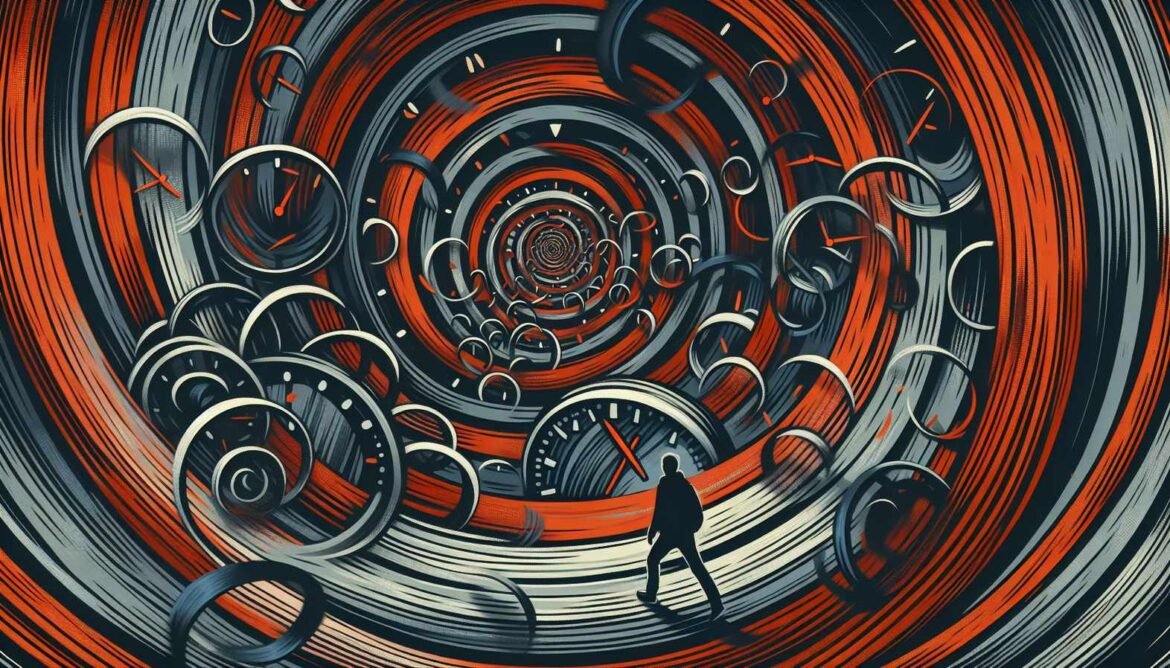“Just this once,” they said. “Just until the launch.” That was three months ago.
You’re working 60-hour weeks. Weekends are gone. Your partner asks when you’ll be home for dinner. You can’t remember the last time you saw sunlight that wasn’t through an office window.
“Just this once” became the new normal. And you’re too exhausted to fight it anymore.
The emergency that never ends
Crunch time. The period before a big launch when everyone works extra hours to meet the deadline. It’s supposed to be temporary. A sprint to the finish line.
But in many companies, crunch time is permanent. One deadline bleeds into another. One emergency morphs into the next. The sprint never ends. You just keep running until you collapse.
The language makes it sound noble. “All hands on deck.” “Push to the finish.” “We’re in this together.” But what it means is: sacrifice your life for the company. And do it with a smile.
How we got here
Crunch culture comes from poor planning disguised as ambition. From managers who promise unrealistic timelines to executives. From sales teams who commit to features before engineering is consulted. From a belief that developers are resources to be maximized, not humans with limits.
It’s perpetuated by tech’s mythology. The startup founder who sleeps under their desk. The game developer pulling all-nighters before launch. The hero who saved the company by working through the weekend.
We celebrate suffering. We wear exhaustion like a badge. “I worked 80 hours this week” becomes a flex instead of a cry for help.
And companies exploit this. They hire people who are young, passionate, desperate to prove themselves. People who will sacrifice everything because they don’t yet know the cost.
What it costs you
Your health goes first. Sleep deprivation. Poor diet. No exercise. Your body runs on caffeine and stress hormones until it breaks down.
Your relationships suffer. Missed birthdays. Cancelled plans. Being physically present but mentally absent. Your loved ones learn to expect disappointment.
Your creativity dies. Exhausted brains don’t innovate. They just survive. That brilliant solution you’d have seen at hour 40? You’ll never find it at hour 70.
Your code quality degrades. More bugs. More shortcuts. More technical debt. You’re not building better by working longer. You’re building worse, slower.
And eventually, you burn out. Not gradually. Suddenly. One day you wake up and can’t do it anymore. Can’t open the laptop. Can’t face another stand-up. Can’t pretend you’re okay.
The productivity lie
Here’s what management doesn’t tell you: working more hours doesn’t mean producing more value.
Studies show productivity drops sharply after 50 hours per week. By hour 60, you’re barely functional. By hour 70, you’re actively making things worse.
A developer working 40 focused hours produces better work than the same developer grinding through 70 exhausted hours. But companies keep pushing for more because hours are easy to measure. Quality isn’t.
The game industry learned this the hard way. Months of crunch before every launch. Developers burning out and leaving. High turnover. Knowledge loss. Projects failing despite the hours poured in.
Some companies are changing. Realizing sustainable pace produces better results. But too many still treat developers like machines that can run at 100% indefinitely.
How to survive crunch culture
Recognize the pattern
If “just this once” keeps happening, it’s not crunch. It’s the culture. And culture doesn’t change because you work harder. It changes when people refuse to participate.
Set boundaries
Decide what you’re willing to give. Maybe you’ll work late during a real emergency. But not every week. Not indefinitely. And not without acknowledgment that it’s unsustainable.
Communicate your limits clearly. “I can work late this week to meet the deadline. But I’ll need recovery time after.” Make the cost visible.
Document the damage
Track your hours. Document the overtime. Note the bugs that came from exhaustion. Make the dysfunction visible.
When management asks why the project failed, you’ll have data. Not just “we worked really hard.” But “we worked 70-hour weeks for 3 months, quality declined by X%, and Y developers burned out.”
Know when to leave
Some companies won’t change. They’ll burn through developers and hire new ones. If you’re in perpetual crunch despite raising concerns, the problem isn’t you. It’s them.
Your health is worth more than any job. Your relationships matter more than any deadline. When a company consistently demands you sacrifice everything, it’s time to find one that won’t.
For leaders who want better
If you manage developers, you have power to change this. Here’s how:
Stop celebrating overwork. Don’t praise the developer who worked all weekend. That’s not dedication. That’s a planning failure.
Build slack into timelines. When sales commits to a deadline, engineering should have input. If they don’t, you’re setting up crunch from day one.
Protect your team from perpetual emergency. Not everything is urgent. Not everything requires all-hands. Filter the noise.
Model healthy behavior. Go home at reasonable hours. Take your vacation. Show that work-life balance isn’t just allowed, it’s expected.
When crunch is unavoidable, acknowledge it. Compensate it. And follow it with recovery time. Don’t pretend it’s normal.
The sustainable alternative
Good companies don’t have perpetual crunch. They have realistic planning. They have buffers in schedules. They have teams that work sustainable hours and produce consistently good work.
They understand that developers aren’t most valuable when working 70 hours. They’re most valuable when they’re rested, creative, and engaged.
They know that shipping on time doesn’t matter if your team quits from exhaustion. That meeting the deadline means nothing if the code is so buggy you spend the next month fixing it.
Sustainable pace isn’t about working less. It’s about working smarter. About valuing quality over quantity. About treating developers like humans, not resources.
You are not a machine
Crunch culture wants you to believe that pushing through exhaustion makes you strong. That sacrificing your life for the company makes you dedicated. That working until you break is what professionals do.
That’s a lie designed to extract maximum value from you before you burn out and get replaced.
The truth? You’re a human with limits. And those limits aren’t weaknesses. They’re reality.
Companies that ignore human limits get short-term gains and long-term failures. Burned out teams. High turnover. Poor quality. And developers who warn others to stay away.
You deserve better than perpetual emergency. Better than endless crunch. Better than a company that takes everything and gives nothing back.
So when they say “just this once,” ask: when does it end? And if they can’t answer, you have your answer.
It’s time to go home.







